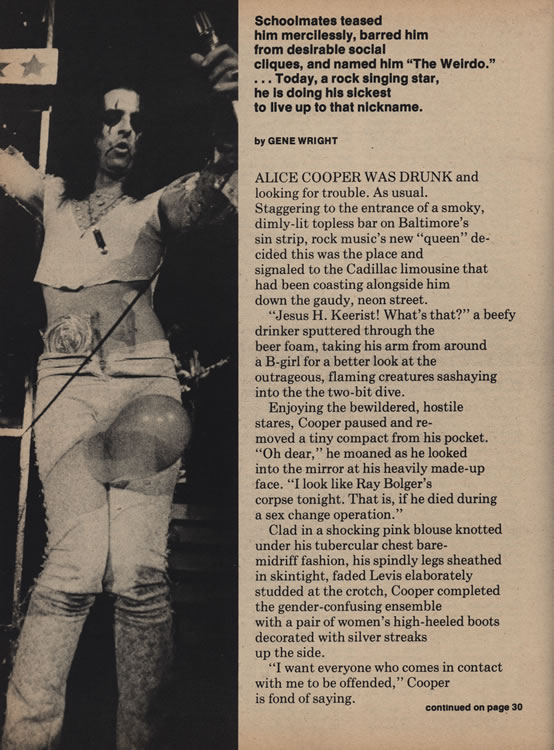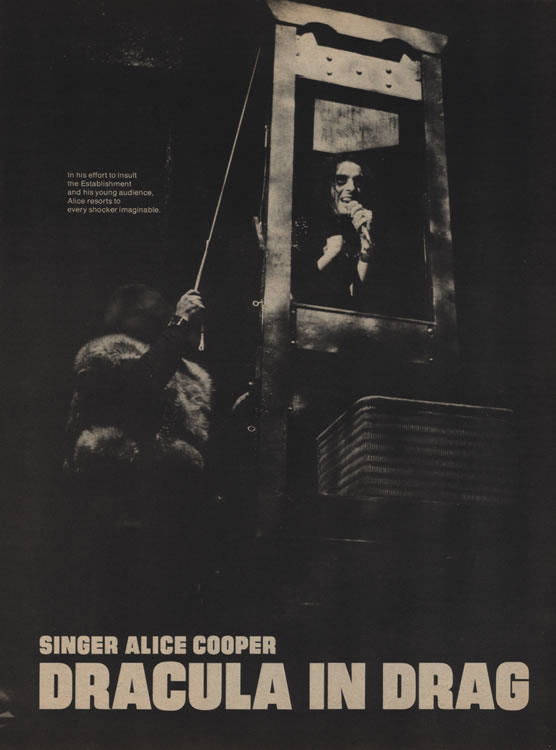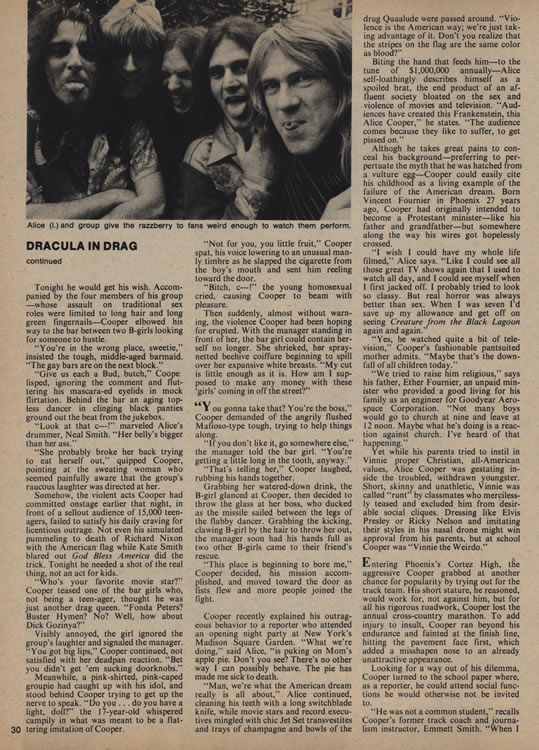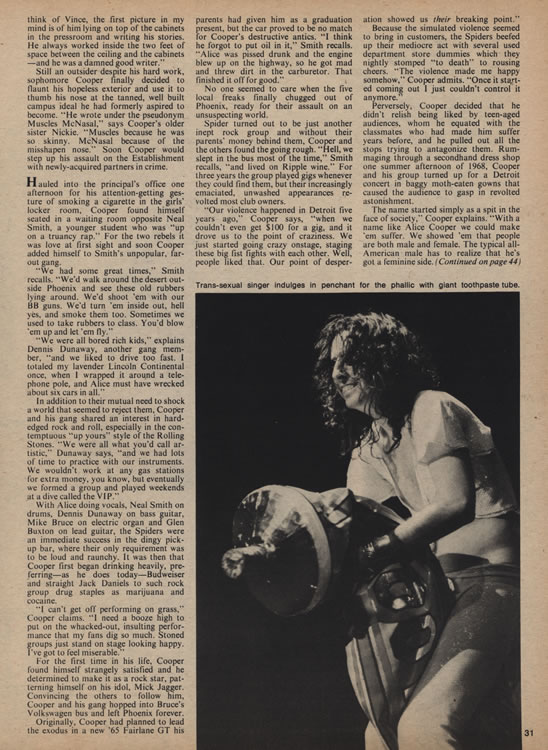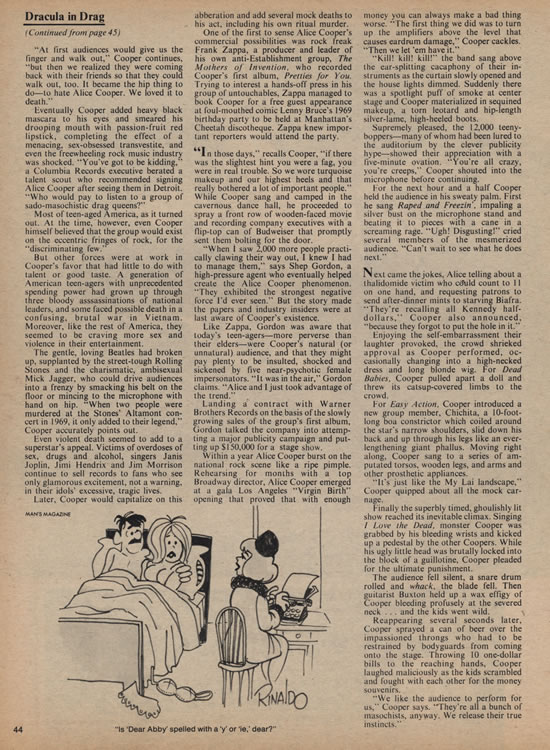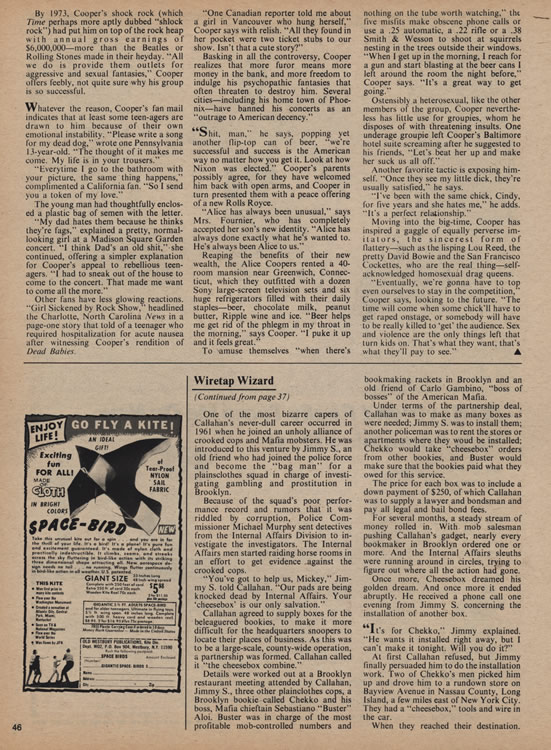Article Database
Dracula in Drag
Schoolmates teased him mercilessly, barred him from desirable social cliques, and named him "The Weirdo." ... Today, a rock singing star, he is doing his sickest to live up to that nickname.
ALICE COOPER WAS DRUNK and looking for trouble. As usual. Staggering to the entrance of a smoky, dimly-lit topless bar on Baltimore's sin strip, rock music's new "queen" decided this was the place and signaled to the Cadillac limousine that had been coasting alongside him down the gaudy, neon street.
"Jesus H. Keerist! What's that?" a beefy drinker sputtered through the beer foam, taking his arm from around a B-girl for a better look at the outrageous, flaming creatures sashaying into the the two-bit dive.
Enjoying the bewildered, hostile stares, Cooper paused and removed a tiny compact from his pocket. "Oh dear," he moaned as he looked into the mirror at his heavily made-up face. "I look like Ray Bolger's corpse tonight. That is, if he died during a sex change operation."
Clad in a shocking pink blouse knotted under his tubercular chest bare-midriff fashion, his spindly legs sheathed in skintight, faded Levis elaborately studded at the crotch, Cooper completed the gender-confusing ensemble with a pair of women's high-heeled boots decorated with silver streaks up the side.
"I want everyone who comes in contact with me to be offended," Cooper is fond of saying.
Tonight he would get his wish. Accompanied by the four members of his group — whose assault on traditional sex roles were limited to long hair and long green fingernails — Cooper elbowed his way to the bar between two B-girls looking for someone to hustle.
"You're in the wrong place, sweetie," insisted the tough, middle-aged barmaid. "The gay bars are on the next block."
"Give us each a Bud, butch," Cooper lisped, ignoring the comment and fluttering his mascaraed eyelids in mock flirtation. Behind the bar an aging topless dancer in clinging black panties ground out the beat from the jukebox.
"Look at that c---!" marveled Alice's drummer, Neal Smith. "Her belly's bigger than her ass."
"She probably broke her back trying to eat herself out," quipped Cooper, pointing at the sweating woman who seemed painfully aware that the group's raucous laughter was directed at her.
Somehow, the violent acts Cooper had committed onstage earlier that night, in front of a sellout audience of 15,000 teenagers, failed to satisfy his daily craving for licentious outrage. Not even his simulated pummeling to death of Richard Nixon with the American flag while Kate Smith blared out God Bless America did the trick. Tonight he needed a shot of the real thing, not an act for kids.
"Who's your favorite movie star?" Cooper teased one of the bar girls who, not being a teenager, thought he was just another drag queen. "Fonda Peters? Buster Hymen? No? Well, how about Dick Gozinya?"
Visibly annoyed, the girl ignored the group's laughter and signaled the manager. "You got big lips," Cooper continued, not satisfied with her deadpan reaction. "Bet you didn't get 'em sucking doorknobs."
Meanwhile, a pink-shirted, pink-caped groupie had caught up with his idol, and stood behind Cooper trying to get up the nerve to speak. "Do you ... do you have a light, doll?" the 17-year-old whispered campily in what was meant to be a flattering imitation of Cooper.
"Not for you, you little fruit," Cooper spat, his voice lowering to an unusual manly timbre as he slapped the cigarette from the boy's mouth and sent him reeling toward the door.
"Bitch, c---!" the young homosexual cried, causing Cooper to beam with pleasure.
Then suddenly, almost without warning, the violence Cooper had been hoping for erupted. With the manager standing in front of her, the bar girl could contain herself no longer. She shrieked, her spraynetted beehive coiffure beginning to spill over her expansive white breasts. "My cut is little enough as it is. How am I supposed to make any money with these 'girls' coming in off the street?"
"You gonna take that? You're the boss," Cooper demanded of the angrily flushed Mafioso-type tough, trying to help things along.
"If you don't like it, go somewhere else," the manager told the bar girl. "You're getting a little long in the tooth, anyway."
"That's telling her," Cooper laughed, rubbing his hands together.
Grabbing her watered-down drink, the B-girl glanced at Cooper, then decided to throw the glass at her boss, who ducked as the missile sailed between the legs of the flabby dancer. Grabbing the kicking, clawing B-girl by the hair to throw her out, the manager soon had his hands full as two other B-girls came to their friend's rescue.
"This place is beginning to bore me," Cooper decided, his mission accomplished, and moved toward the door as fists flew and more people joined the fight.
Cooper recently explained his outrageous behavior to a reporter who attended an opening night party at New York's Madison Square Garden. "What we're doing," said Alice, "is puking on Mom's apple pie. Don't you see? There's no other way I can possibly behave. The pie has made me sick to death.
"Man, we're what the American dream really is all about," Alice continued, cleaning his teeth with a long switchblade knife, while movie stars and record executives mingled with chic Jet Set transvestites and trays of champagne and bowls of the drug Quaalude were passed around. "Violence is the American way; we're just taking advantage of it. Don't you realize that the stripes on the flag are the same color as blood?"
Biting the hand that feeds him — to the tune of $1,000,000 annually — Alice self-loathingly describes himself as a spoiled brat, the end product of an affluent society bloated on the sex and violence of movies and television. "Audiences have created this Frankenstein, this Alice Cooper," he states. "The audience comes because they like to suffer, to get pissed on."
Although he takes great pains to conceal his background — preferring to perpetuate the myth that he was hatched from a vulture egg — Cooper could easily cite his childhood as a living example of the failure of the American dream. Born Vincent Furnier in Phoenix 27 years ago, Cooper had originally intended to become a Protestant minister — like his father and grandfather — but somewhere along the way his wires got hopelessly crossed.
"I wish I could have my whole life filmed," Alice says. "Like I could see all those great TV shows again that I used to watch all day, and I could see myself when I first jacked off. I probably tried to look so classy. But real horror was always better than sex. When I was seven I'd save up my allowance and get off on seeing Creature from the Black Lagoon again and again."
"Yes, he watched quite a bit of television," Cooper's fashionable pant-suited mother admits. "Maybe that's the downfall of all children today."
"We tried to raise him religious," says his father, Ether Furnier, an unpaid minister who provided a good living for his family as an engineer for Goodyear Aerospace Corporation. "Not many boys would go to church at nine and leave at 12 noon. Maybe what he's doing is a reaction against church. I've heard of that happening."
Yet while his parents tried to instil in Vinnie proper Christian, all-American values, Alice Cooper was gestating inside the troubled, withdrawn youngster. Short, skinny and unathletic, Vinnie was called "runt" by classmates who mercilessly teased and excluded him from desirable social cliques. Dressing like Elvis Presley or Ricky Nelson and imitating their styles in his nasal drone might win approval from his parents, but at school Cooper was "Vinnie the Weirdo."
Entering Phoenix's Cortez High, the aggressive Cooper grabbed at another chance for popularity by trying out for the track team. His short stature, he reasoned, would work for, not against him, but for all his rigorous roadwork, Cooper lost the annual cross-country marathon. To add injury to insult, Cooper ran beyond his endurance and fainted at the finish line, hitting the pavement face first, which added a misshapen nose to an already unattractive appearance.
Looking for a way out of his dilemma, Cooper turned to the school paper where, as a reporter, he could attend social functions he would otherwise not be invited to. "He was not a common student," recalls Cooper's former track coach and journalism instructor, Emmett Smith. "When I think of Vince, the first picture in my mind is of him lying on top of the cabinets in the pressroom and writing his stories. He always worked inside the two feet of space between the ceiling and the cabinets — and he was a damned good writer."
Still an outsider despite his hard work, sophomore Cooper finally decided to flaunt his hopeless eXterior and use it to thumb his nose at the tanned, well built campus ideal he had formerly aspired to become. "He wrote under the pseudonym Muscles McNasal," says Cooper's older sister Nickie. "Muscles because he was so skinny. McNasal because of the misshapen nose." Soon Cooper would step up his assault on the Establishment with newly-acquired partners in crime.
Hauled into the principal's office one afternoon for his attention-getting gesture of smoking a cigarette in the girls' locker room, Cooper found himself seated in a waiting room opposite Neal Smith, a younger student who was "up on a truancy rap." For the two rebels it was love at first sight and soon Cooper added himself to Smith's unpopular, farout gang.
"We had some great times," Smith recalls. "We'd walk around the desert outside Phoenix and see these old rubbers lying around. We'd shoot 'em with our BB guns. We'd turn 'em inside out, hell yes, and smoke them too. Sometimes we used to take rubbers to class. You'd blow 'em up and let 'em fly."
"We were all bored rich kids," explains Dennis Dunaway, another gang member, "and we liked to drive too fast. I totaled my lavender Lincoln Continental once, when I wrapped it around a telephone pole, and Alice must have wrecked about six cars in all."
In addition to their mutual need to shock a world that seemed to reject them, Cooper and his gang shared an interest in hard edged rock and roll, especially in the contemptuous "up yours" style of the Rolling Stones. "We were all what you'd call artistic," Dunaway says, "and we had lots of time to practice with our instruments. We wouldn't work at any gas stations for extra money, you know, but eventually we formed a group and played weekends at a dive called the VIP."
With Alice doing vocals, Neal Smith on drums, Dennis Dunaway on bass guitar, Mike Bruce on electric organ and Glen Buxton on lead guitar, the Spiders were an immediate success in the dingy pickup bar, where their only requirement was to be loud and raunchy. It was then that Cooper first began drinking heavily, preferring — as he does today — Budweiser and straight Jack Daniels to such rock group drug staples as marijuana and cocaine.
"I can't get off performing on grass," Cooper claims. "I need a booze high to put on the whacked-out, insulting performance that my fans dig so much. Stoned groups just stand on stage looking happy. I've got to feel miserable."
For the first time in his life, Cooper found himself strangely satisfied and he determined to make it as a rock star, patterning himself on his idol, Mick Jagger. Convincing the others to follow him, Cooper and his gang hopped into Bruce's Volkswagen bus and left Phoenix forever.
Originally, Cooper had planned to lead the exodus in a new '65 Fairlane GT his parents had given him as a graduation present, but the car proved to be no match for Cooper's destructive antics. "I think he forgot to put oil in it," Smith recalls. "Alice was pissed drunk and the engine blew up on the highway, so he go mad and threw dirt in the carburetor. That finished it off for good."
No one seemed to care when the five local freaks finally chugged out of Phoenix, ready for their assault on an unsuspecting world.
Spiders turned out to be just another inept rock group and without their parents' money behind them, Cooper and the others found the going rough. "Hell, we slept in the bus most of the time," Smith recalls, "and lived on Ripple wine." For three year the group played gigs whenever they could find them, but their increasingly emaciated, unwashed appearances revolted most club owners.
"Our violence happened in Detroit five years ago," Cooper says, "when we couldn't even get $100 for a gig, and it drove us to the point of craziness. We just started going crazy onstage, staging these big fights with each other. Well, people liked that. Our point of desperation showed us their breaking point."
Because the simulated violence seemed to bring in customers, the Spiders beefed up their mediocre act with several used department store dummies which they nightly stomped "to death" to rousing cheers. "The violence made me happy somehow," Cooper admits. "Once it started coming out I just couldn't control it anymore."
Perversely, Cooper decided that he didn't relish being like by teen-aged audiences, whom he equated with the classmates who had made him suffer years before, and he pulled out all the stops trying to antagonize them. Rummaging through a secondhand dress shop one summer afternoon of 1968, Cooper and his group turned up for a Detroit concert in baggy moth-eaten gowns that caused the audience to gasp in revolted astonishment.
The name started simply as a spit in the face of society," Cooper explains. "With a name like Alice Cooper we could make 'em suffer. We showed 'em that people are both male and female. The typical all-American male has to realize that he's got a feminine side.
"At first audiences would give us the finger and walk out," Cooper continues, "but then we realized they were coming back with their friends so that they could walk out, too. It became the hip thing to do — to hate Alice Cooper. We loved it to death."
Eventually Cooper added heavy black mascara to his eyes and smeared his drooping mouth with passion-fruit red lipstick, completing the effect of a menacing, sex-obsessed transvestite, and even the freewheeling rock music industry was shocked. "You've got to be kidding," a Columbia Records executive berated a talent scout who recommended signing Alice Cooper after seeing them in Detroit. "Who would pay to listen to a group of sado-masochistic drag queens?"
Most of teenaged America, as it turned out. At the time, however, even Cooper himself believed that the group would exist on the eccentric fringes of rock, for the "discriminating few."
But other forces were at work in Cooper's favor that had little to do with talent or good taste. A generation of American teenagers with unprecedented spending power had grown up through three bloody asssassinations of national leaders, and some faced possible death in a confusing, brutal war in Vietnam. Moreover, like the rest of America, they seemed to be craving more sex and violence in their entertainment.
The gentle, loving Beatles had broken up, supplanted by the street-tough Rolling Stones and the charismatic, ambisexual Mick Jagger, who could drive audiences into a frenzy by smacking his belt on the floor or mincing to the microphone with hand on hip. "When two people were murdered at the Stones' Altamont concert in 1969, it only added to their legend," Cooper accurately points out.
Even violent death seemed to add to a superstar's appeal. Victims of overdoses of sex, drugs and alcohol, singers Janis Joplin, Jimi Hendrix and Jim Morrison continue to sell records to fans who see only glamorous excitement, not a warning, in their idols' excessive, tragic lives.
Later, Cooper would capitalize on this abbertation and add several mock deaths to his act, including his own ritual murder.
One of the first to sense Alice Cooper's commercial possibilities was rock freak Frank Zappa, a producer and leader of his own anti-Establishment group, The Mother of Invention who recorded Cooper's first album, Pretties for You. Trying to interest a hands-off press in his group of untouchables, Zappa managed to book Cooper for a free guest appearance at foul-mouthed comic Lenny Bruce's 1969 birthday party to be held at Manhattan's Cheetah discotheque. Zappa knew important reporters would attend the party.
"In those days," recalls Cooper, "if there was the slightest hint you were a fag, you were in real trouble. So we wore turquoise makeup and our highest heels and that really bothered a lot of important people." While Cooper sang and camped in the cavernous dance hall, he proceeded to spray a front row of wooden-faced movie and recording company executives with a flip-top can of Budweiser that promptly sent them bolting for the door.
"When I saw 2,000 more people practically clawing their way out, I knew I had to manage them," says Shep Gordon, a high-pressure agent who eventually helped create the Alice Cooper phenomenon. "They exhibited the strongest negative force I'd ever seen." But the story made sure the papers and industry insiders were at last aware of Cooper's existence.
Like Zappa, Gordon was aware that today's teenagers — more perverse than their elders — were Cooper's natural (or unnatural) audience, and that they might pay plenty to be insulted, shocked and sickened by five near-psychotic female impersonators. "It was in the air," Gordon claims. "Alice and I just took advantage of the trend."
Landing a contract with Warner Brothers Records on the basis of the slowly growing sales of the group's first album, Gordon talked the company into attempting a major publicity campaign and putting up $150,000 for a stage show.
Within a year Alice Cooper burst on the national rock scene like a ripe pimple. Rehearsing for months with a top Broadway director, Alice Cooper emerged at a gala Los Angeles "Virgin Birth" opening that proved that with enough money you can always make a bad thing worse. "The first thing we did was to turn up the amplifiers above the level that causes eardrum damage," Cooper cackles. "Then we let 'em have it."
"Kill! kill! kill!" the band sang above the ear-splitting cacophony of their instruments as the curtain slowly opened and the house lights dimmed. Suddenly there was a spotlight puff of smoke at center stage and Cooper materialized in sequined makeup, a torn leotard and hip-length silver-lame, high-heeled boots.
Supremely pleased, the 12,000 teenyboppers — many of whom had been lured to the auditorium by the clever publicity hype — showed their appreciation with a live-minute ovation. "You're all crazy, you're creeps," Cooper shouted into the microphone before continuing.
For the next hour and a half Cooper held the audience in his sweaty palm. First he sang Raped and Freezin', impaling a silver bust on the microphone stand and beating it to pieces with a cane in a screaming rage. "Ugh! Disgusting!" cried several members of the mesmerized audience. "Can't wait to see what he does next."
Next came the jokes, Alice telling about a thalidomide victim who could count to 11 on one hand, and requesting patrons to send after-dinner mints to starving Biafra. "They're recalling all Kennedy half dollars," Cooper also announced, "because they forgot to put the hole in it."
Enjoying the self-embarrassment their laughter provoked, the crowd shrieked approval as Cooper performed, occasionally changing into a high-necked dress and long blonde wig. For Dead Babies, Cooper pulled apart a doll and threw its catsup-covered limbs to the crowd.
For Easy Action, Cooper introduced a new group member, Chichita, a l0-footlong boa constrictor which coiled around the star's narrow shoulders, slid down his back and up through his legs like an ever lengthening giant phallus. Moving right along, Cooper sang to a series of amputated torsos, wooden legs, and arms and other prosthetic appliances.
"It's just like the My Lai landscape," Cooper quipped about all the mock carnage.
Finally the superbly timed, ghoulishly lit show reached its inevitable climax. Singing I Love the Dead, monster Cooper was grabbed by his bleeding wrists and kicked up a pedestal by the other Coopers. While his ugly little head was brutally locked into the block of a guillotine, Cooper pleaded for the ultimate punishment.
The audience fell silent, a snare drum rolled and whack, the blade fell. Then guitarist Buxton held up a wax effigy of Cooper bleeding profusely at the severed neck ... and the kids went wild.
Reappearing several seconds later, Cooper sprayed a can of beer over the impassioned throngs who had to be restrained by bodyguards from coming onto the stage. Throwing 10 one-dollar bills to the reaching hands, Cooper laughed maliciously as the kids scrambled and fought with each other for the money souvenirs.
"We like the audience to perform for us," Cooper says. '"They're all a bunch of masochists, anyway. We release their true instincts."
By 1973, Cooper's shock rock (which Time perhaps more aptly dubbed "shlock rock") had put him on top of the rock heap with annual gross earnings of $6,000,000 — more than the Beatles or Rolling Stones made in their heyday. "All we do is provide them outlets for: aggressive and sexual fantasies," Cooper offers feebly, not quite sure why his group is so successful.
Whatever the reason, Cooper's fan mail indicates that at least some teen-agers are drawn to him because of their own emotional instability. "Please write a song for my dead dog," wrote one Pennsylvania 13-year-old. "The thought of it makes me come. My life is in your trousers."
"Everytime I go to the bathroom with your picture, the same thing happens," complimented a California fan. "So I send you a token of my love."
The young man had thoughtfully enclosed a plastic bag of semen with the letter.
"My dad hates them because he thinks they're fags," explained a pretty, normallooking girl at a Madison Square Garden concert. "I think Dad's an old shit," she continued, offering a simpler explanation for Cooper's appeal to rebellious teenagers. "I had to sneak out of the house to come to the concert. That made me want to come all the more."
Other fans have less glowing reactions. "Girl Sickened by Rock Show," headlined the Charlotte, North Carolina News in a page-one story that told of a teenager who required hospitalization for acute nausea after witnessing Cooper's rendition of Dead Babies.
"One Canadian reporter told me about a girl in Vancouver who hung herself," Cooper says with relish. "All they found in her pocket were two ticket stubs to our show. Isn't that a cute story?"
Basking in all the controversy, Cooper realizes that more furor means more money in the bank, and more freedom to indulge his psychopathic fantasies that often threaten to destroy him. Several cities — including his home town of Phoenix — have banned his concerts as an "outrage to American decency."
"Shit, man," he says, popping yet another flip-top can of beer, "we're successful and success is the American way no matter how you get it. Look at how Nixon was elected." Cooper's parents possibly agree, for they have welcomed him back with open arms, and Cooper in turn presented them with a peace offering of a new Rolls Royce.
"Alice has always been unusual," says Mrs. Furnier, who has completely accepted her son's new identity. "Alice has always done exactly what he's wanted to. He's always been Alice to us."
Reaping the benefits of their new wealth, the Alice Coopers rented a 40-room mansion near Greenwich, Connecticut, which they outfitted with a dozen Sony large-screen television sets and six huge refrigerators filled with their daily staples — beer, chocolate milk, peanut butter, Ripple wine and ice. "Beer helps me get rid of the phlegm in my throat in the morning," says Cooper. "I puke it up and it feels great."
To amuse themselves "when there's nothing on the tube worth watching," the five misfits make obscene phone calls or use a .25 automatic, a .22 rifle or a .38 Smith & Wesson to shoot at squirrels nesting in the trees outside their windows. "When I get up in the morning, I reach for a gun and start blasting at the beer cans I left around the room the night before," Cooper says. "It's a great way to get going."
Ostensibly a heterosexual, like the other members of the group, Cooper nevertheless has little use for groupies, whom he disposes of with threatening insults. One underage groupie left Cooper's Baltimore hotel suite screaming after he suggested to his friends, "Let's beat her up and make her suck us all off."
Another favorite tactic is exposing himself. "Once they see my little dick, they're usually satisfied," he says.
"I've been with the same chick, Cindy, for five years and she hates me," he adds. "It's a perfect relationship."
Moving into the big-time, Cooper has inspired a gaggle of equally perverse imitators, the sincerest form of flattery — such as the lisping Lou Reed, the pretty David Bowie and the San Francisco Cockettes, who are the real thing — selfacknowledged homosexual drag queens.
"Eventually, we're gonna have to top even ourselves to stay in the competition," Cooper says, looking to the future. "The time will come when some chick'll have to get raped onstage, or somebody will have to be really killed to 'get' the audience. Sex and violence are the only things left that turn kids on. That's what they want, that's what they'll pay to see."



